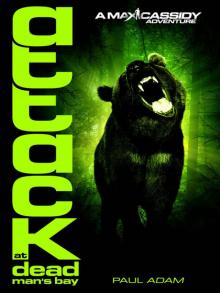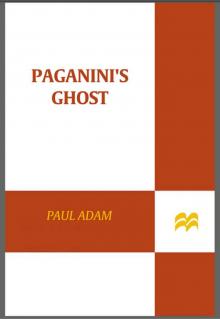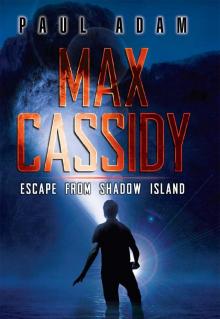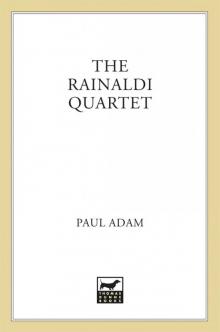The Rainaldi Quartet Read online
Page 15
Sofia’s programme was an intriguing mixture of pieces: a first half comprising Beethoven’s Spring Sonata and the Bach unaccompanied partita, the second a selection of lighter works by Saint-Saëns, Sarasate, Wieniawski and Paganini. It had an old-fashioned feel to it. It was the kind of eclectic programme that the giants of the early twentieth century would have tackled – men like Ysaÿe, Kreisler and Elman – but which you don’t tend to see so often nowadays. Soloists today tend to favour weightier programmes, a more earnest selection of music which they feel reflects the seriousness of their purpose, their perception of themselves as profound artists. Well, they are artists, but they are entertainers too and I was glad to see that Sofia was willing to take a few risks to show off the full range of her talents.
The Beethoven was warm and lyrical, a duet in which the violin and piano parts wove in and out of each other like courting eels, slipping coyly over one another in a seductive dance, breaking apart for a time then coiling back into another lubricious embrace before their final magnificent union. I exaggerate perhaps, I lose control of my metaphors, I know, but I am an emotional man and the performance was a delight to me.
Then came the Bach, and from the first notes I knew that Sofia had what it took to be a great musician. She played with an authority, an intensity, almost a wild abandon that was mesmerising. I could feel the bodies around me stiffen, senses awaken, our eyes and ears and thoughts focused on nothing except that spine-tingling sound. The hall ceased to exist, the world beyond it was a memory from a different life. There was just a girl on a platform with a violin.
No one seemed to move, no one coughed or rustled their programmes. And when she started the final Chaconne – perhaps the greatest piece of writing for the violin in the entire repertoire – I felt a prickle like a rash creep over my skin and knew unequivocally that there was not a single person in the audience who was not feeling the same. Tears came into my eyes. This piece had been such a part of my life. Hearing it now took me back fifty years to my youth when as a thirteen-year-old boy I used to struggle clumsily through the chords, searching for the notes, searching for a voice which this young woman was now finding with such a sublime, intoxicating ease.
At the end there was a full half-minute’s silence, the last chords melting away into the ether, before anyone clapped. Then the applause was like an explosion. One person stood up, then another. Soon the entire audience was on its feet. Sofia stood petrified to the spot for a few seconds, then she smiled and her eyes flickered around the hall, taking in the golden approbation.
Five times she left the platform and five times she returned for yet another bow before – our hands sore from clapping – we allowed her to escape our enthusiastic embrace. The doors were opened and the euphoric atmosphere permitted to slip away.
We rose from our seats to stretch our legs.
‘That was just incredible,’ Margherita said enthusiastically as we walked out into the open courtyard next to the concert hall. ‘I don’t know much about violinists, but she was electrifying.’
‘Wasn’t she just,’ I agreed. ‘One to watch for the future.’
‘And you know her?’
‘She’s the granddaughter of my old friend, Tomaso. The one I told you about who was killed.’
‘Ah, yes, I remember,’ Margherita said softly.
‘If he’d been here tonight, he would have been so proud of her.’
‘Rightly so. She was terrific. But she has other family here?’
‘Oh, yes. Her mother, her father, grandmother, lots of support.’
‘Don’t let me keep you from them, Gianni. I’m just going to the ladies’. I’ll see you back inside.’
I glanced around the courtyard. Sofia’s family must still have been in the recital hall. I wasn’t sure I wanted to see them just at the moment. There was something too painful about being here without Tomaso – for both them and me. But a couple of metres away I noticed Serafin’s mistress talking to a woman with a mass of unruly jet-black hair. The woman looked familiar, though I couldn’t place her. They broke apart and the dark-haired woman moved away to talk to another group.
‘Good evening, Maddalena,’ I said.
Maddalena turned and looked at me, surprised and haughty like a wealthy courtesan whose under butler has had the temerity to address her.
‘Ciao…’ She waved a manicured hand helplessly as if she couldn’t recall my name.
‘I didn’t know you liked music.’
‘But of course. I adore it.’
She looked around for someone more interesting to talk to, but there were no obvious candidates nearby. She was stuck with me. She fanned herself with her programme.
‘Who was the woman you were talking to just a moment ago?’ I asked.
‘Magda? You mean Magda Scamozzi?’
Of course, now I remembered. Ludovico Scamozzi’s wife. She’d been a concert violinist herself once, if my memory served me right. But she’d given it up after meeting Scamozzi. As so often when two musicians – two anything – marry, the husband’s career had taken precedence.
‘She used to play, didn’t she?’ I said. ‘What was her name then, her maiden name? Magda…’
‘Erzsébet. But it wasn’t her maiden name. She had another husband, before Ludovico.’
‘She was a talented player, I seem to recall.’
Maddalena shrugged. ‘I didn’t know her then. I met her only through Vincenzo.’
‘Where is Vincenzo tonight?’
‘He’s gone to the country,’ Maddalena said waspishly.
So he was visiting his wife and family. Poor Serafin, I thought. No, poor wife and family.
‘He’s back from Venice then?’ I said.
‘He’s been back for days.’
‘Do you know Venice at all?’ I asked casually.
Her hard blue eyes came to rest on my face. ‘Not well,’ she said. ‘It’s a long time since I was there.’ She glanced away, spying an escape route. ‘Excuse me, I see someone I know.’
I walked back to my seat in the hall and waited for Margherita to join me. When Sofia returned to the platform with her pianist there was a brief burst of applause, then a hush of anticipation descended over the audience. She played Saint-Saëns and Sarasate and Wieniawski, bravura pieces which are regularly dismissed as shallow and lightweight. But there was nothing shallow about Sofia’s performance. Her interpretation transcended the glittering fireworks, drawing out the soul of the music and scattering it profligately across the auditorium. Fritz Kreisler once said that if he could live his life over again he would ignore the great warhorses of the repertoire and devote himself solely to light music. Sitting there among the rapt audience, I knew what he meant. There was a joy in these pieces, a joy in the way Sofia played them, that made my spirits soar.
Then she moved on to Paganini, the Moses Variations and Le Streghe, The Witches’ Dance, the piece that more than any other of his compositions gave rise to the speculation that Paganini was in league with the Devil. Indeed, at one performance several witnesses – of apparently sound mind – swore they saw Satan himself directing the virtuoso’s bow arm and fingers. I’ve attempted the piece and, believe me, it would take more than the Devil at my elbow to enable me to play it. But Sofia was in need of no assistance, supernatural or otherwise. She was in her element, the runs and harmonics and all the other fiendish contortions executed as if they were no more difficult than a simple one-octave scale. This was stratospheric violin playing where technique wasn’t in the fingers but in the mind, the difference between someone who played the notes and someone who played the music. Sofia went for it. She was herself and it was an exhilarating privilege to behold.
There was no respectful silence at the end. The applause and shouts of approval erupted before the final chord had died away. Then we were on our feet again, giving her another standing ovation which she acknowledged with a bow and a shy smile of pleasure. If the purpose of music is to make the heart sing, then she ha
d transformed our cardiac organs into a heavenly choir.
‘Do you want to come backstage with me?’ I said to Margherita, leaning over to make myself heard above the noise of the applause.
She shook her head. ‘I’d feel an intruder. I’ll wait for you outside.’
I knew Sofia would have her family and friends with her, perhaps a few agents too, circling her predatorily. But after our conversation of the afternoon I felt I should congratulate her on her performance.
The door to the green room was open. As I came down the corridor, I could hear Scamozzi’s grating metallic voice.
‘… that’s something you need to work on,’ he was saying.
I paused on the threshold. Sofia was standing in the middle of the room looking tired and crestfallen.
‘… some of the intonation was awry, you should watch that, and your bow arm tightened up near the end of the Saint-Saëns. Little things but they all make a difference…’
Sofia saw me and her face broke into a smile. Scamozzi turned and scowled at me, then swung back to continue his post mortem examination of her recital. I stepped forward, interrupting his flow.
‘Magnificent,’ I said. ‘Absolutely magnificent.’ I took Sofia’s hand. In the process I may have trodden on Scamozzi’s foot, but if I did it was purely accidental.
‘That was a triumph,’ I continued. ‘You should be very proud.’
‘As for the Wieniawski…’ Scamozzi persisted, but Sofia was no longer listening. Somehow our positions had shifted so that Scamozzi was now talking to my back.
‘You are going to go far,’ I said warmly. ‘In years to come I will boast that I was at your début recital.’
‘Thank you.’
She was in a daze, lost for words. She would probably remember nothing of this, so overwhelmed was she by the response of the audience and her relief that the recital had gone so flawlessly. By tomorrow it would all seem a wash of smiling faces and murmured goodwill, the details lost in the warm flood of euphoric recall.
Other people were coming into the room now. A cascade of thick black hair brushed past me and I heard a woman’s impassioned voice.
‘Sofia, darling. So good, so good. Unbelievable.’
It was Magda Scamozzi, as fulsome in her praise as her husband was reticent. She threw her arms around Sofia and hugged her tight.
‘What can I say?’ she said, her Italian coloured with the inflections of Eastern Europe. ‘You are a star in the making. They loved you. Didn’t they, Ludovico?’
‘Well, I don’t think we should get too carried away…’ Scamozzi began, but was cut short by his effusive wife.
‘Nonsense, of course we are going to get carried away. She was perfect, perfect. This is your night, Sofia. You float up into the clouds, enjoy the moment. You are young, full of promise. Wallow in your triumph. You will have many more in the future, but none of them will taste as sweet as this. The champagne, Ludovico. What did I do with the champagne? Ah, there it is. Fetch some glasses, we must celebrate … Ludovico, the glasses.’
Another wave of wellwishers enveloped Sofia. I saw Clara and Giulia. I took Clara’s hands in mine. She forced a weak smile. Her eyes were moist. Neither of us said anything. We didn’t need to. Our thoughts were the same. She turned away, reaching for her handkerchief. I blinked away my own tears.
‘He should have been here,’ Clara said indistinctly.
‘He was here in spirit,’ I replied. ‘He always will be.’
She wiped her eyes and nodded. ‘He would have been so happy.’
‘I know.’
‘I mustn’t cry. It will upset Sofia. Wasn’t she good?’
‘She was superb.’ I glanced around. ‘She’s waiting for you.’
‘Come and see me, Gianni.’
‘I will.’
I watched her go to her granddaughter and embrace her. I felt out of place. This was a family moment. I paused to compose myself and went back out of the room. Margherita was waiting for me in the courtyard. We walked out through the gates of the Conservatorio.
‘Can I give you a lift home?’ I said.
‘Don’t worry, I’ll get a taxi,’ Margherita said. She took a scrap of paper and a pen from her shoulder-bag. ‘Give me your phone number.’
She wrote down my number, then stepped closer.
‘Thank you for a wonderful evening, Gianni. We must do it again.’
She reached up and kissed me on the cheek. I inhaled her perfume, felt the touch of her lips, her body close to mine. Then she was gone, walking away down the street with her shoulder-bag swinging against her hip.
9
If anyone gave the lie to the notion that the English are a cold, reserved race it was Rudy Weigert. Rudy, admittedly, was perhaps not a typical Englishman. Though born in the country, his parents were Austrian Jews who had come to England before the war, and Rudy – in both appearance and temperament – had as many of the Central European characteristics of his ancestors as he did of his birthplace. But nonetheless I still thought of him as an Englishman, and a warmer, more demonstrative and emotionally open man it was difficult to imagine. He was standing now in the doorway of his office, his arms outstretched and a gleam of pleasure in his eyes.
‘Gianni! Gianni, my old friend,’ he cried. ‘Why didn’t you tell me? Come in, come in.’
I stepped over the threshold and felt Rudy’s arms embrace me in a welcoming bear hug – if bear is the apposite description for someone of Rudy’s diminutive height and gargantuan girth. I am not a particularly tall man, but the top of Rudy’s head came to only just above my solar plexus. The wobbling expanse of his stomach between us made me feel as if I were being squeezed against a large balloon filled with warm water.
‘You should have told me you were coming,’ Rudy said reproachfully. ‘How long have you been here?’
‘I only flew in this morning. I came straight here from the airport.’
‘It’s good to see you. Come and sit down. You’ll have a drink, of course.’
Without waiting for a reply, Rudy waddled over to the large cabinet behind his desk and filled – and I mean filled – two glasses with malt whisky. He handed a glass to me and beamed with a real, unconcealed affection.
‘It’s been too long, Gianni. You should come more often. Where are you staying? We’ve always got a bed for you, you know that.’
‘I’m not on my own, Rudy.’
He leered at me. ‘No? You’re a dark horse, Gianni. Who is she?’
‘It’s not a woman. It’s a friend from Cremona.’
‘Well, where is he? I want to meet him.’
‘He’s trying to find somewhere to park our car.’
‘Round here? He may be some time. You want a smoke?’
Rudy flipped open a humidor the size of a pirate’s chest and extracted a couple of fat Cuban cigars. As a rule, I never smoke, but I’m always prepared to make an exception for one of Rudy’s cigars. He gave me a light, then sat down on the sofa at the side of his office, gesturing to me to join him. I squeezed into what little space remained and settled back in the soft cushions.
‘This has really made my day,’ Rudy said. ‘You’re looking well. It must be all that sunshine and pasta. We’re a little short on the sun here, but I’m doing my best with the pasta.’
He patted his stomach fondly and laughed, his face creasing into a squashy sponge of hollows and double chins.
‘Your timing is perfect,’ he continued. ‘I’ve a fiddle you can look at for me. I’d value your opinion on it.’
I was flattered. Rudy was his auction house’s principal string instrument expert, a world authority on violins.
‘Of course,’ I said. ‘What is it?’
‘Well, it’s labelled Nicolò Amati, a good, authentic-looking label too. But I’m not sure. The date on the label is 1631. That makes me wonder.’
Violins from the early 1630s are extremely rare. Very few seem to have been made then, probably because the plague was sweeping a
cross northern Italy. Nicolò Amati’s father, Girolamo, himself a fine violin-maker, was killed in the epidemic in 1630 and two years later Maggini succumbed to the same disease. People were more interested in staying alive than buying violins.
‘You think it’s a fake?’ I said.
‘The violin’s undoubtedly old. I think the label’s been changed. From the purfling, the roughness of finish on the scroll, I think it may be an Andrea Guarneri, but I’d like your view. I’ll show it to you later. How’s your whisky?’
‘Big,’ I said.
‘The way it should be.’ He waved his cigar expansively. ‘You’re over for the sales, I assume. Something in the catalogue you’ve got your eye on?’
‘No, we’re on our way to the north. Derbyshire.’
‘Nice. You’ll like it up there. Wonderful countryside. Violins?’
‘We’re looking at some old letters. Just a sideline we’re following up.’ I paused. ‘I wanted to ask you a favour, Rudy.’
‘Fire away.’
‘You’ve got databases you can check, sources of information that aren’t available to me. I’m trying to find out something about a Maggini violin – the Snake’s Head Maggini. You know the one I mean?’
‘I certainly do. It was one of ours.’
I stared at him. ‘You sold it?’
‘Five, six years ago. I remember it well. It was one of the best Magginis we’ve ever had. There was a lot of interest, I seem to recall, a lot of bidding. I’ll check for you.’
Rudy went across to the computer on his desk and tapped a few keys.
‘This is just a summary. I have the full file on paper somewhere. Here we are. Yes, autumn sales, 1998. It went for £120,000. Buyer – your old friend, Vincenzo Serafin.’
I started. ‘Serafin?’
‘You seem surprised.’
‘No … well, maybe a little. But I shouldn’t be. I know he goes to auctions for all sorts of clients.’

 Attack at Dead Man's Bay
Attack at Dead Man's Bay Paganini's Ghost
Paganini's Ghost Escape from Shadow Island
Escape from Shadow Island The Rainaldi Quartet
The Rainaldi Quartet Jaws of Death
Jaws of Death